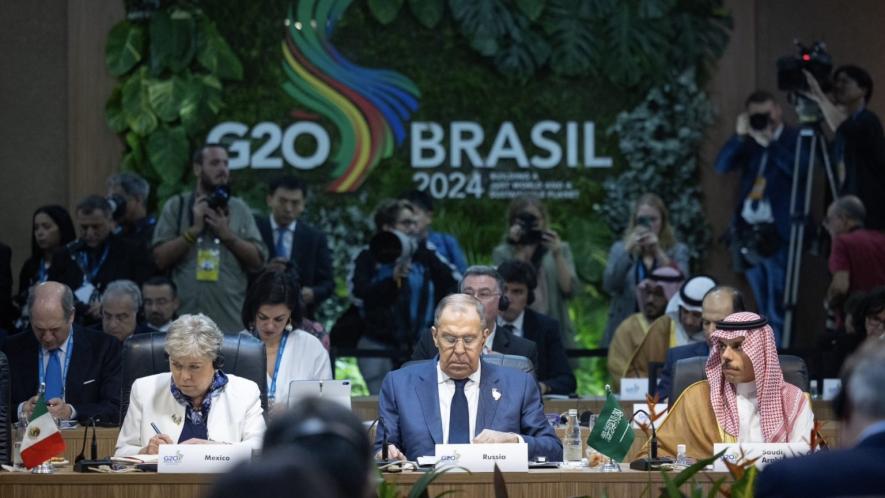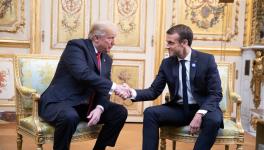October 7 has Changed the Equation for Gulf States

Saudi Arabia's Foreign Minister Faisan bin Farhan participating in the G20 Ministerial meeting. Photo: SA Foreign Ministry
Saudi Arabia issued a sharp condemnation of the Israeli massacre on February 29 of Palestinians in Gaza standing in line to receive aid, now known as the “flour massacre”. The Saudi Ministry of Foreign Affairs called on the international community to take a firm stance and require Israel to observe the international laws of human rights.
Weeks earlier, the ministry issued a statement to “strongly warn of the dangerous consequences of an attack on the city of Rafah in the Gaza Strip.” The statement also expresses a strong condemnation of any attempts towards a forced evacuation of Palestinians and echoed its calls for an immediate cessation of the war in Gaza.
These statements have been echoed in the interventions of Foreign Minister Faisal bin Farhan in all major international forums in the last several months such as the G20 Ministerial meeting, the Munich Security Conference, the Foreign Ministers meeting of the Organization of Islamic Cooperation, the UN Human Rights Council and others.
On February 27, bin Salman received Ukrainian President Volodymyr Zelensky on a state visit in Riyad. Zelensky likely found a different reception than what he had anticipated. Statements released after the meeting by both sides pointed out broad agreements on the importance of the goal of reaching real peace in the Ukraine, preparations for a world gathering on peace in Switzerland, and an understanding on economic and technological cooperations between the two countries. In his post on X , Zelensky thanked bin Salman for his support for peace efforts.
It is reasonable to assume, however, that Zelensky did not travel to Saudi Arabia in the middle of a war to talk about technological cooperation between the two countries. Nor is Saudi Arabia a stakeholder or a major kingmaker in the Russia-Ukraine war.
Zelensky likely went to Riyad expecting substantive support from Saudi Arabia in its war. Ukraine’s war against Russia is largely funded by the United States and Western European powers. Statements from both sides strongly suggest that Saudi Arabia will not fund or support Ukraine.
Normalization U-turn
The recent change of course in Saudi Arabia’s foreign policy represents a significant turnaround from the kingdom’s policies just a few months ago. As recently as in September 2023, bin Salman was making statements on reaching a normalization deal with Israel. “Everyday we get closer.” Bin Salman went on to say: “It seems it’s for the first time a real one, serious.” A pact with Israel, bin Salman stated, would be “the biggest historical deal since the Cold War.”
Along the same lines, in September, bin Salman claimed that such a deal would “ease the life of Palestinians.” But he refused to even half-heartedly endorse the establishment of an independent Palestinian state. A Palestinian state has not only been a basic demand of every Palestinian entity, up to then it had been the Saudi official position as a prerequisite for recognizing Israel for decades.
The Biden administration was touting Saudi support for the Abraham Accords as a major foreign policy accomplishment. Israeli Prime Minister Benjamin Netanyahu had made normalization with the Saudi kingdom a top priority for his administration. If Saudi Arabia recognized Israel, with many other Arab states in the Persian Gulf region and beyond sure to follow, it would have been a major victory for Israel and the United States. Conversely, this would have been a major setback for Iran and other countries continuing to refuse to recognize Israel on the grounds that it is an illegitimate, colonial, settler state built on stolen land.
But October 7, 2023 has profoundly changed the political landscape of the region. With Hamas’ launch of the “Operation Al-Aqsa Flood,” the relationship between Israel and the Palestinian people entered a new stage. In the past, every few years, Israel would launch a bombing campaign against Gaza, killing thousands of civilians but claiming that it was an operation against terrorism. People within the Israeli establishment called these murderous campaigns a “haircut.”
Israel’s current genocide in Gaza, however, has taken the ruthless killing of Palestinians to a whole new level, unprecedented even for Israel, which has a long list of genocidal campaigns on its report card.
When the United Arab Emirates and Bahrain signed the Abraham Accords in 2020, it was not based on lack of sympathy for the Palestinian cause among their people, and certainly not based on some kind of sympathy for Israeli Apartheid. The kings of the UAE and Bahrain decided at the time that signing these accords would not have a significant domestic cost for them, irrespective of how unpopular the decision would be. They assumed that, finally, it was time to accept that Israel had achieved total victory, total dominance and permanent stability. Saudi Arabia was close to following on that path.
October 7 proved that the Palestinian people have not accepted defeat, nor are they about to stop their struggle, no matter how heavy the cost. The global movement in support of Palestine has proven that the Palestinian people have the support of most of humanity. Every time millions of people around the globe have marched in condemnation of Israel’s genocide, the chants of “Free, Free Palestine” have reverberated in the Middle East.
In a December 4, 2023 opinion piece published in Time, Sarah Leah Whitson, Executive Director of the nonprofit Democracy for the Arab World Now, wrote “it’s time to scrap the Abraham Accords.” While this might still be a topic for debate in Western circles, it is obvious in the Arab world that making peace with Israel is not a viable policy today.
Regional leaders under pressure
As the Arab masses, along with the rest of the world, are witnessing Israel’s genocide unfolding, they are demanding that their governments do something to stop Israel. The leaders of Saudi Arabia and other reactionary Arab countries have not suddenly developed a human rights consciousness, nor have they suddenly discovered the plight of the Palestinian people, suffering at the hands of Israel since al Nakba, in 1948.
But they are worried about the stability of their rule. Discontent for their policies towards Palestine might sow the seeds of movements against their governments. It does not help their cause that Yemen, with limited resources, after 8 years of Saudi occupation, destruction, and starvation has done more in solidarity with Palestine than all the oil-rich Arab monarchies combined.
The Palestinian struggle has, once again, transformed the balance of forces in the region. Every Arab state, including Saudi Arabia, is making daily statements about the Israeli carnage and pledging aid for the Palestinians.
With the number of Palestinian victims surpassing 30,000 and the Israeli onslaught yielding little tangible military results other than the slaughter of the civilians, it will be a long time before any Arab politician can sweep the plight of Palestinians under the rug and extend a hand of friendship towards Israel.
Mazda Majidi is a long-time social justice and anti-war activist and an activist with the ANSWER Coalition. He has written extensively on US intervention in the Middle East and beyond.
Get the latest reports & analysis with people's perspective on Protests, movements & deep analytical videos, discussions of the current affairs in your Telegram app. Subscribe to NewsClick's Telegram channel & get Real-Time updates on stories, as they get published on our website.
























